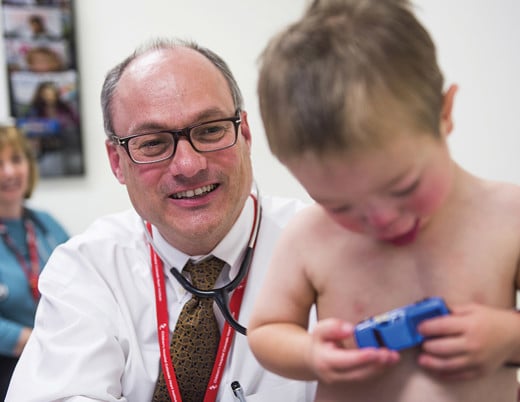Imagine this: A patient who just had a kidney transplant has an echocardiogram during their follow-up appointment. This test tells you how their transplant might have affected their cardiovascular health, which is important, since cardiovascular disease is the number one long-term cause of death for kidney transplant recipients.
But there is no consistent plan for what to do with the results after the test, so they sit in someone's inbox and there's never any follow-up. What if those results showed that the patient had acquired hypertension? What will happen to the patient's new kidney, and their heart, because of the hypertension?
Inconsistencies like this are everywhere in transplant programs, explains Jens Goebel, MD, Medical Director of Kidney Transplantation at Children's Hospital Colorado. Simple yet infuriating process failures undermine the effectiveness of excellent care, medication and research, and they put the new organ at risk for premature failure.
Leading consistent processes on a national scale
That's why Dr. Goebel is co-leading a national quality improvement program to regulate these processes: Improving Renal Outcomes Collaborative, or IROC, invites pediatric hospitals nationwide to share data about patients, learn from each other and implement consistent processes across the board.
"Our pie-in-the-sky goal is that children with a kidney transplant will do just as well as completely healthy children," Dr. Goebel says. "Doing things the way we typically do them only gets us so far. We miss too many opportunities to really achieve the best outcomes for our patients. We know we can get them a lot closer."
Some of these opportunities include measuring blood pressure regularly and at night, and practicing cholesterol management guidelines 100% of the time. Dr. Goebel and members of IROC found that when caregivers simply checked a patient's LDL cholesterol consistently, and provided interventions when appropriate, the LDL cholesterol levels improved.
Closing the loop to deliver exceptional patient care
One of Dr. Goebel's first initiatives with IROC is to create an annual report card, or a "structured summary of what happens at a transplant patient's annual evaluation," he says. The results of the evaluation "loop back to families with action items, and tells the center that these tests were done and what they're supposed to be doing with results."
Dr. Goebel hopes this will empower a patient's primary care provider and family to be more involved in the patient's health management.
"The report card would force us to do things more reliably and consistently," Dr. Goebel says. "It's not rocket science, but it's clear that these things are not yet happening."
Ethnographer joins nephrology team
Two IROC sites — Children's Colorado and Cincinnati Children's Hospital — are the first pediatric nephrology programs to include an ethnographer as part of quality improvement.
The ethnographer — a person who studies the cultural behaviors of groups and individuals — observes both the habits and processes of the medical team, and also observes patients and families in their homes.
"They get an idea of what is it really like to be a school-age child who needs to take medications two to three times a day," Dr. Goebel says. "It's totally separate from what we do as doctors in the clinics. They synthesize their observations and come up with ideas and suggestions of how we can do our quality improvement work better, in a way that really helps these patients and families."
Although Dr. Goebel says IROC is still too young to see how the ethnographers have improved outcomes, he does credit them for bringing patient and family perspectives into IROC at an unprecedented level. The ethnographers are also responsible for facilitating patients' and families' participation in IROC design sessions.





 720-777-0123
720-777-0123










